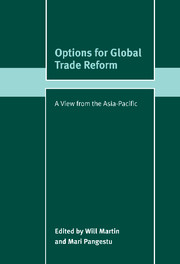Book contents
- Frontmatter
- Contents
- List of figures
- List of tables
- List of abbreviations and acronyms
- List of contributors
- 1 An overview: options for global trade reform – a view from the Asia-Pacific
- 2 Agriculture and the Doha Development Agenda
- 3 Liberalizing trade in manufactures
- 4 Returning textiles and clothing to GATT disciplines
- 5 Approaches to further liberalization of trade in services
- 6 Liberalization of air transport services
- 7 Liberalization of maritime transport services
- 8 International trade in telecoms services
- 9 East Asia and options for negotiations on investment
- 10 Competition policy, developing countries, and the World Trade Organization
- 11 The long and winding road to the Government Procurement Agreement: Korea's accession experience
- 12 Trade facilitation in the World Trade Organization: Singapore to Doha and beyond
- 13 Trade, the environment, and labor: text, institutions, and context
- Index
- References
11 - The long and winding road to the Government Procurement Agreement: Korea's accession experience
Published online by Cambridge University Press: 22 September 2009
- Frontmatter
- Contents
- List of figures
- List of tables
- List of abbreviations and acronyms
- List of contributors
- 1 An overview: options for global trade reform – a view from the Asia-Pacific
- 2 Agriculture and the Doha Development Agenda
- 3 Liberalizing trade in manufactures
- 4 Returning textiles and clothing to GATT disciplines
- 5 Approaches to further liberalization of trade in services
- 6 Liberalization of air transport services
- 7 Liberalization of maritime transport services
- 8 International trade in telecoms services
- 9 East Asia and options for negotiations on investment
- 10 Competition policy, developing countries, and the World Trade Organization
- 11 The long and winding road to the Government Procurement Agreement: Korea's accession experience
- 12 Trade facilitation in the World Trade Organization: Singapore to Doha and beyond
- 13 Trade, the environment, and labor: text, institutions, and context
- Index
- References
Summary
In every country, the government provides public services such as defense, administration, education, and infrastructure to its citizens. In providing these public services, government agencies engage in public procurement of goods and services. The procurement expenditures in a country are always quite a large share of total government expenditures, which often represent a significant share of gross domestic product (GDP). As one would expect, therefore, the size of the world government procurement market is huge. The world's total potential non-defense government procurement market is estimated to be close to $1.5 trillion a year.
It is important for a country to set up an good system of government procurement in order to ensure an efficient allocation of its limited government resources, which come mostly from taxes collected from its citizens. Governments have in fact developed formal rules and procedures in an effort to achieve efficiency in government procurement. Because of their nature, however, government purchases are somewhat different from those of private entities. Public entities are generally believed to be less efficient in purchasing goods and services than private entities. In fact, some researchers have found empirically that, by introducing more competitive tendering and outsourcing from the private sector to the process of government procurement, governments could save 20 percent or more without loss of quality in the goods and services being purchased (see Domberger, Hall, and Li 1995).
- Type
- Chapter
- Information
- Options for Global Trade ReformA View from the Asia-Pacific, pp. 249 - 269Publisher: Cambridge University PressPrint publication year: 2003
References
- 6
- Cited by



